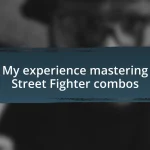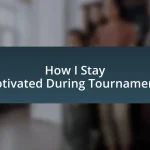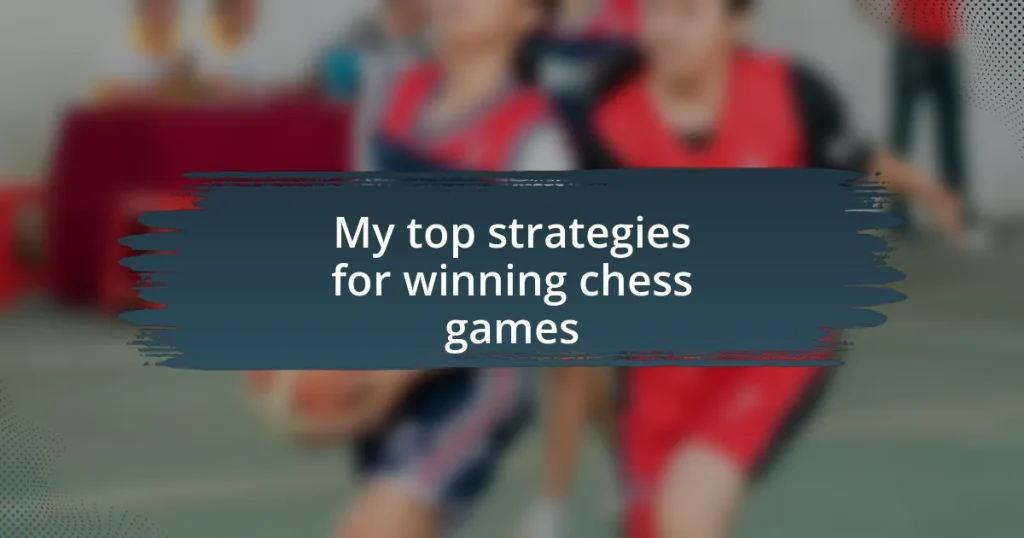Key takeaways:
- Understanding chess fundamentals is critical, including piece development, center control, and relative piece value.
- Developing a winning mindset involves emotional control, maintaining a positive attitude in adversity, and setting clear goals for improvement.
- Effective opening strategies include controlling the center, developing pieces early, ensuring king safety, and being adaptable.
- Endgame techniques focus on creating passed pawns, activating the king, and understanding pawn structure to dictate the game flow.
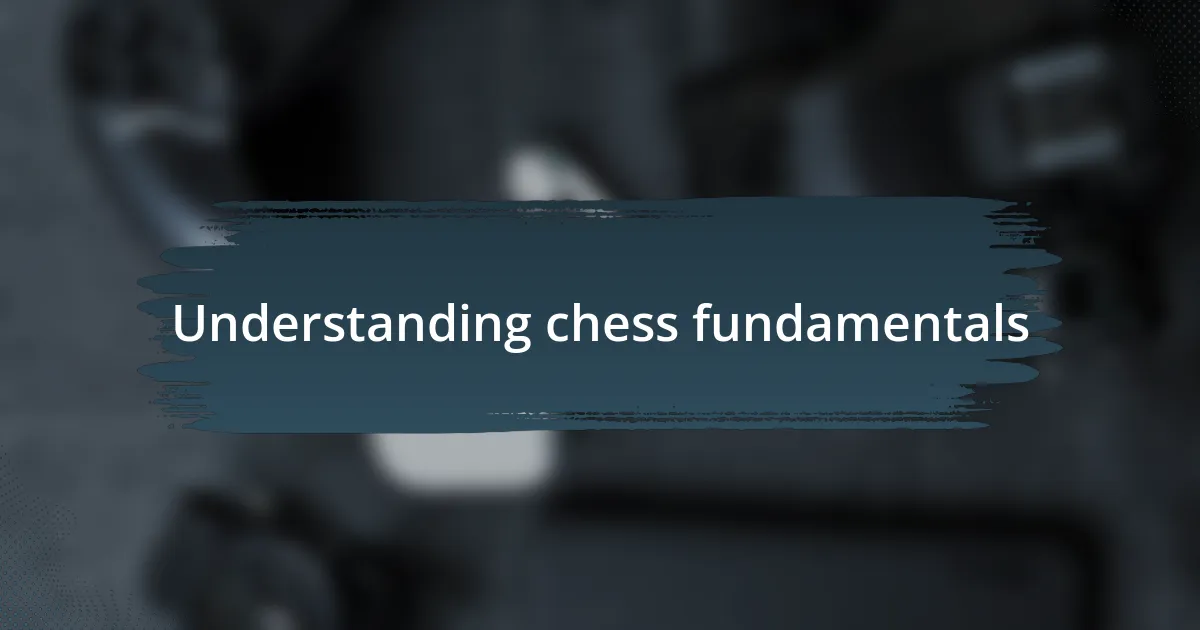
Understanding chess fundamentals
Understanding chess fundamentals requires a grasp of key principles like controlling the center, protecting your pieces, and developing them efficiently. I remember my early days when I would focus solely on capturing pieces without considering their positioning on the board. Have you ever felt that rush of excitement when you capture an opponent’s piece, only to realize later that your own pieces are left unguarded?
The importance of piece development can’t be overstated. When I first learned to play, I often ignored the knights and bishops in favor of pushing my pawns. Over time, I discovered that getting those pieces into the game early can create powerful threats and offer more options for attack and defense. It’s that balance between offense and defense that often decides the outcome of a match.
Finally, understanding relative piece value is critical. I had a coach who constantly reminded me that a pawn might not seem valuable, but its effect on the game can be profound, especially in the endgame. Have you ever made a decisive move that turned the tide of a game just by promoting a pawn? Grasping these fundamentals really shapes how you approach each game, creating opportunities for strategy and creativity.
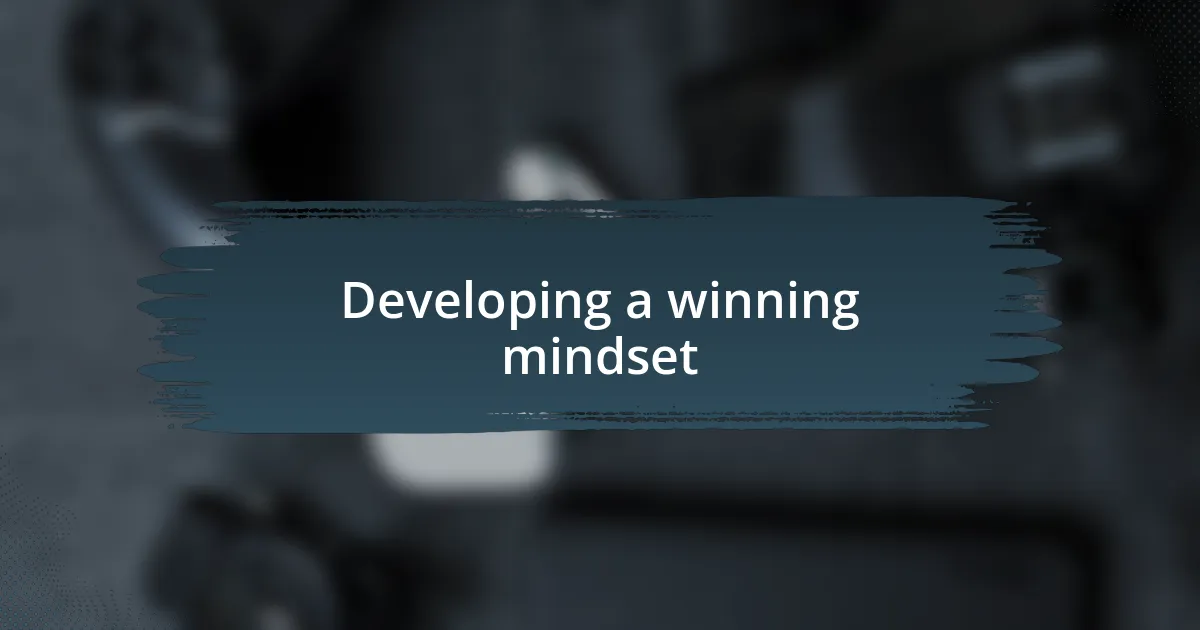
Developing a winning mindset
Developing a winning mindset is crucial in chess, far beyond just knowing the moves. One of my most memorable experiences was losing an important game because I let my emotions cloud my judgment. Have you ever felt the weight of expectation? It can be overwhelming, but learning to control that pressure can be a game-changer. I realized that taking a deep breath and refocusing on the board can help me reset my mental state and strategize more effectively.
Another aspect of a winning mindset is maintaining a positive attitude, even in the face of adversity. I once faced a formidable opponent who made an aggressive opening move that caught me off guard. In that moment, I chose to view the situation as an opportunity to learn rather than a setback. Shifting my perspective helped me stay composed, allowing me to think critically and adapt my strategy throughout the game. Have you ever turned a tough position into an advantage simply because you refused to give up?
Lastly, setting clear goals for each game can enhance your performance. Before a match, I often jot down three specific objectives, whether it’s improving my opening strategy or practicing endgame techniques. This approach keeps me focused and helps me track my progress over time. It’s intriguing how having a roadmap can transform how you engage with the game.
| Mindset Aspect | Personal Experience |
|---|---|
| Emotional Control | Resetting focus after a loss |
| Positive Perspective | Learning from surprising moves |
| Goal Setting | Using objectives to track improvement |
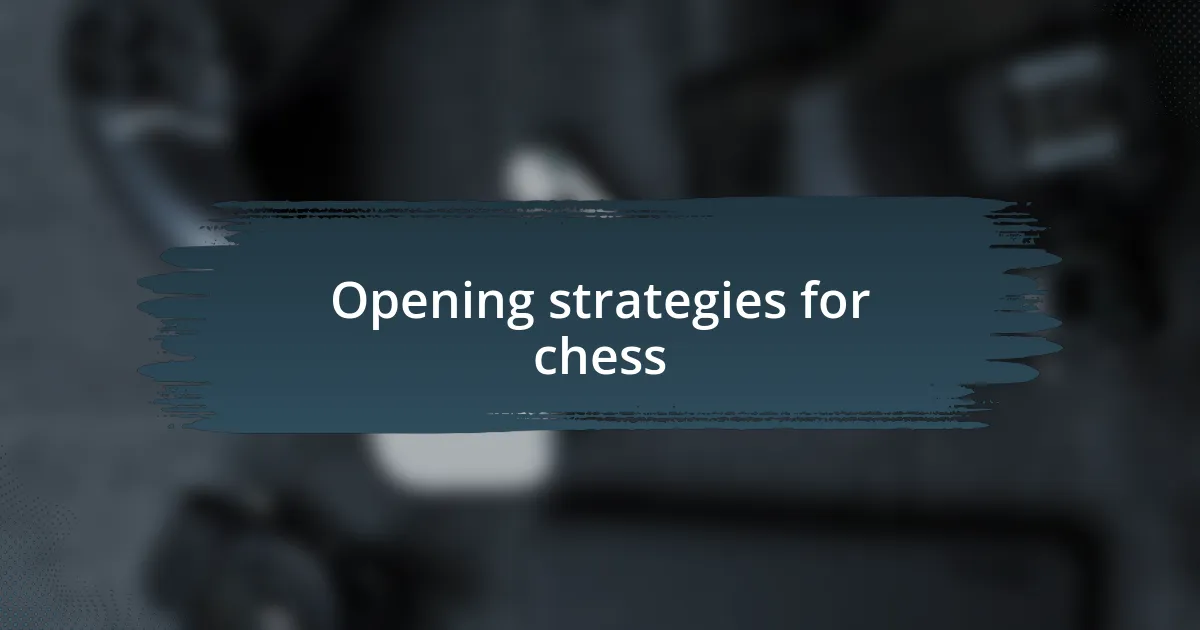
Opening strategies for chess
Opening strategies are the backbone of a solid chess game. I’ve often found that a well-thought-out opening can set the tone for the entire match. The initial few moves are not just about developing pieces; they’re about claiming territory and creating a foundation for both offense and defense. I remember a time I employed the Sicilian Defense, and it opened up a dynamic game that put my opponent on the back foot. The thrill of being able to dictate the pace and direction of the match can be exhilarating.
Here are some effective opening strategies to consider:
- Control the Center: Moving pawns to e4 or d4 helps establish dominance in the middle of the board.
- Develop your Pieces: Focus on getting knights and bishops out early to control key squares.
- King Safety: Ensure your king’s safety by castling early, sometimes even before launching an attack.
- Use Established Openings: Familiarize yourself with popular openings like the Ruy Lopez or the French Defense to gain confidence and strategic insights.
- Adapt to Your Opponent: Pay attention to what your opponent plays and adjust your strategy accordingly.
Embracing these strategies not only enhances gameplay but also ramps up the excitement of engaging with each opponent. I often feel a rush of anticipation when I think about how my opening choice can influence the whole game, and it reminds me to treat each match as an adventure, each move a story unfolding.
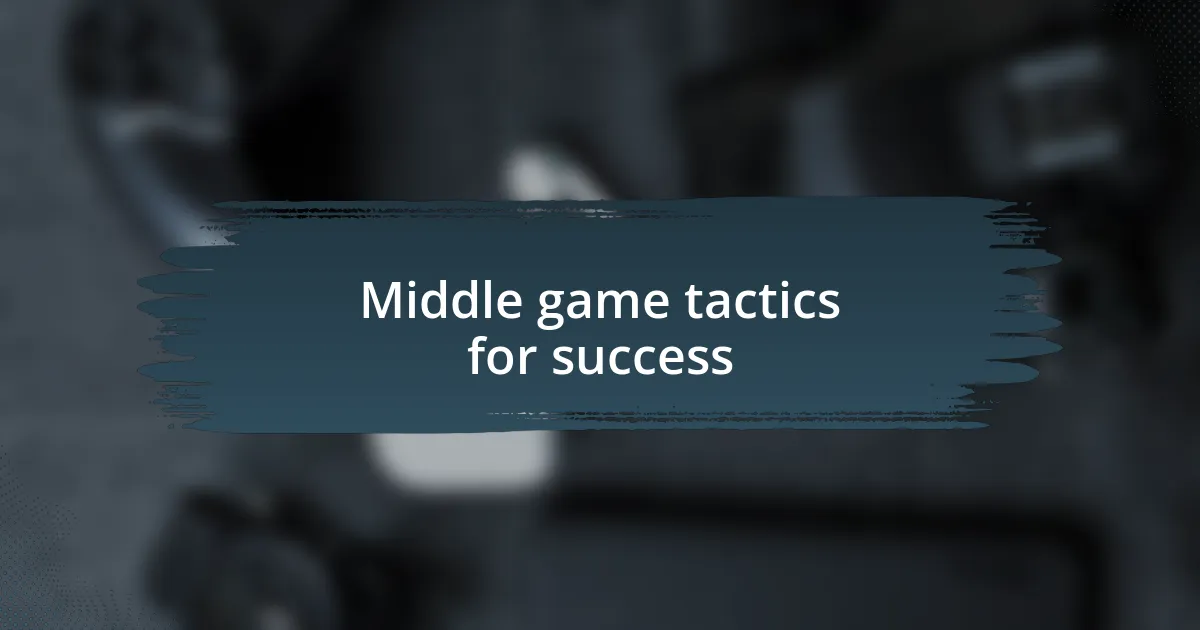
Middle game tactics for success
In the middle game, I often rely on tactical opportunities that arise from previous moves. This phase of the game is where creativity meets calculation. I vividly remember a match where I noticed my opponent made a small oversight in their pawn structure. Seizing the moment, I launched a minor tactic that turned into a decisive advantage, leading to a swift victory. It really reinforced for me how crucial it is to stay alert and trust your instincts during this pivotal part of the game.
Another tactic that has served me well is leveraging pins and forks. For instance, I once positioned my knight in a way that simultaneously attacked my opponent’s queen and a rook. The exhilaration of creating such a dilemma for them brought a rush of joy! These tactics are not just about gaining material but also about psychological pressure. I often wonder how my opponents feel when they realize their pieces are under threat; it’s a blend of excitement and strategy that keeps the game engaging.
Moreover, my experiences have taught me the importance of maintaining flexibility. I’ve encountered situations where I planned to execute a specific strategy, only to discover new opportunities emerging. In one memorable game, I shifted my entire approach after an unexpected exchange left my opponent vulnerable. Embracing adaptability can be the difference between a mediocre game and a gripping victory. Have you ever found yourself changing strategies mid-game? Those moments truly highlight the dynamic nature of chess.
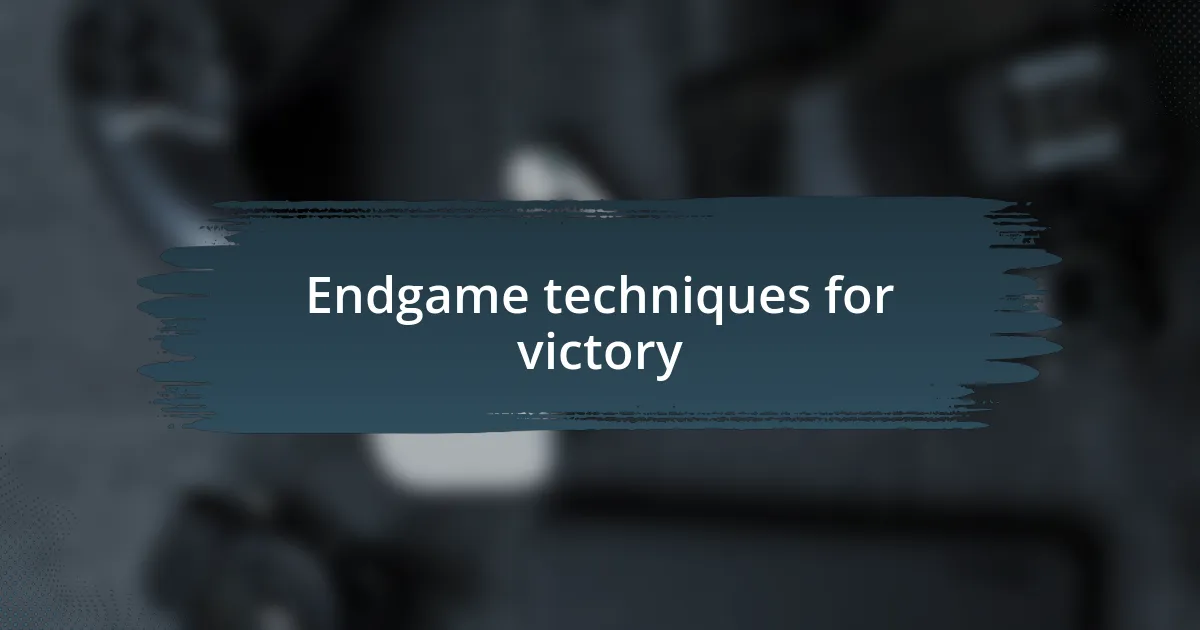
Endgame techniques for victory
In the endgame, every piece holds significant weight, and I’ve learned to appreciate the power of simplicity. I recall a time when I was left with just a king and a pawn against a lone king. The tension was palpable as I maneuvered my pawn toward promotion, realizing that even one small misstep could cost me the game. It struck me just how critical it was to ensure my king protected the pawn while pushing it forward; the coordination between my pieces transformed the endgame into a beautiful dance of strategy.
One technique I often utilize is creating passed pawns. There was a match where I managed to advance a pawn while blocking my opponent’s chances to create their own. As that pawn steadily advanced towards promotion, I felt a surge of confidence. Watching my opponent scramble to defend against my looming queen was exhilarating. It highlighted how establishing threats in the endgame can often pressure opponents into making mistakes, don’t you think?
Additionally, I always prioritize the king’s activation during the endgame. I have vivid memories of shifting my king aggressively in the final stages, carving out crucial pathways for my pawns. There was a moment when I trapped my opponent’s pieces behind my own advancing soldiers. The realization that my king could be both a defender and an attacker was a game-changer. Have you ever felt that shift in dynamics when your king plays a decisive role? That transformation can often seal the fate of the game.
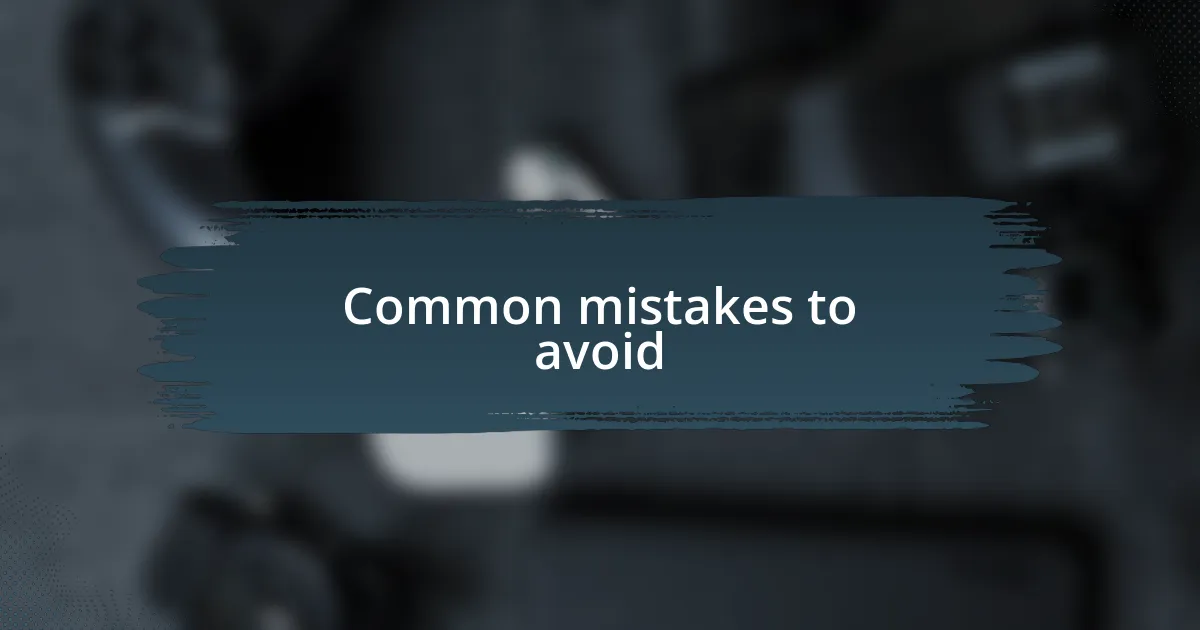
Common mistakes to avoid
In my chess journey, I’ve noticed that one common mistake is neglecting piece development in the opening. There was a memorable game where I focused too much on controlling the center without bringing my pieces into play. My opponent took advantage of my slow start, launching an attack that left me scrambling. Have you ever found yourself in a position where your pieces felt trapped because you delayed their activation?
Another blunder I often reflect on is overlooking tactical opportunities. I recall an intense match where I was so focused on my long-term strategy that I missed a chance to win material with a simple fork. The frustration was palpable when I realized what I had let slip through my fingers. It’s a reminder that while planning is crucial, staying alert to immediate threats and opportunities can change the course of a game. How do you balance planning with being aware of the board’s dynamics?
Lastly, one mistake I sometimes see, and have made myself, is failing to account for pawn structure. In a game where I had a strong position, I ignored the enemy’s pawn formation. That oversight led to my opponent creating a passed pawn that I struggled to stop. It taught me that understanding pawn structure is essential, as it can dictate the flow of the game and lead to creating key weaknesses in your opponent’s camp. Have you ever underestimated the power of a seemingly innocent pawn?
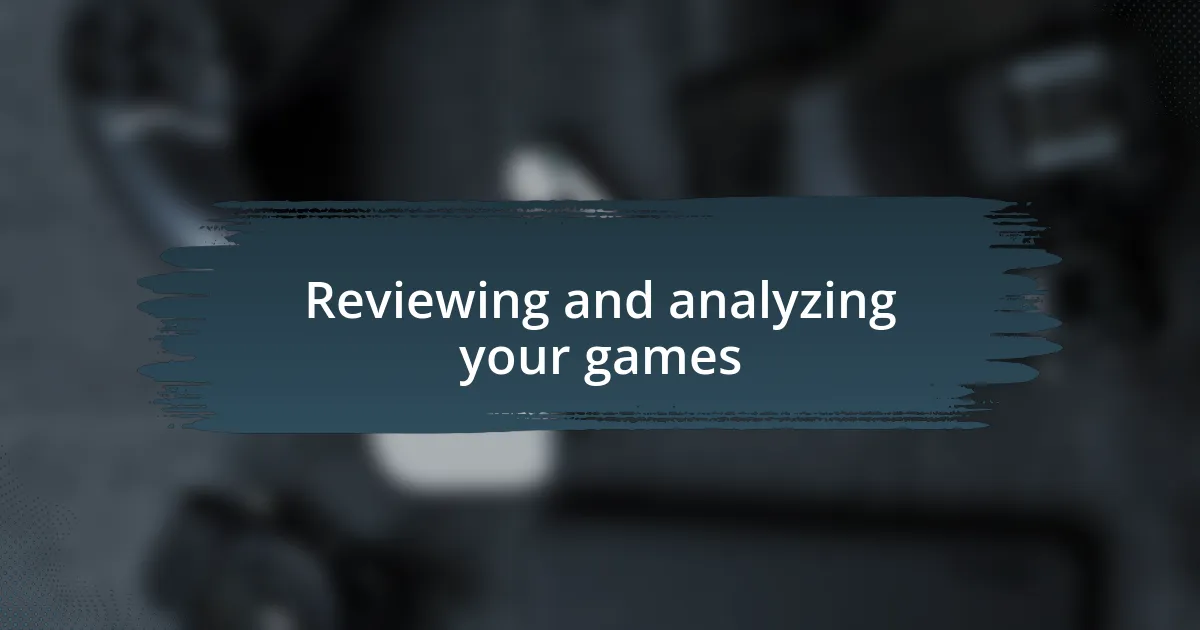
Reviewing and analyzing your games
When reviewing my games, I often find that analyzing my moves in detail reveals patterns I might not notice during play. For instance, after a recent loss, I sat down with a chess engine and saw that several of my decisions were driven by emotion rather than logic. Have you ever walked away from a game thinking you played your best, only to realize later that your emotions led you astray?
I make it a point to compare my thought process during the game with the engine’s suggestions afterward. There was a time when I thought I was making sound moves, but the analysis showed that I missed a crucial tactic that could have changed the outcome. This reflective practice has become essential; it’s like having a mentor in my chess journey. Have you considered how an objective analysis could enhance your understanding of the game?
Engaging with chess communities to discuss analyzed games can also provide fresh perspectives. I remember sharing a game where I blundered a piece, and the feedback I received highlighted not just my mistake but also alternative strategies that I hadn’t even considered. This exchange of ideas can be incredibly enlightening. How often do you seek outside feedback to refine your own game analysis?

